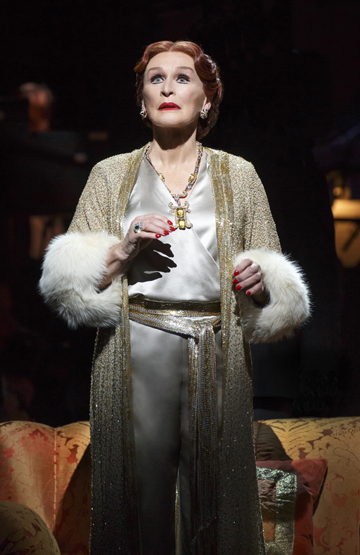
BY CHRISTOPHER BYRNE | There really is only word to describe the revival of “Sunset Boulevard” now on Broadway: glorious. Andrew Lloyd Webber’s sprawling musical adaptation of the Billy Wilder movie has always been larger than life, as befits the legendary Hollywood it attempts to portray. Yet under Lonny Price’s brilliant direction, the musical both maintains its epic scope and becomes a heartbreaking, human-scaled story of longing and loss, a mound of ashes beneath a heavy dusting of glitter.
In telling the tale of faded, silent film star Norma Desmond and Joe Gillis, the jaded, failing writer who becomes her lover, Price draws so much depth and dimension out of the characters that one can’t help rooting for them, even as they spiral toward inevitable destruction. The original production was overwhelming and bordered on Grand Guignol. Norma was a macabre curiosity, a grotesque, and Joe was callous and opportunistic. In this production, the two are tragic heroes, done in by desperation, denial, and the ache to fit into a world that doesn’t want or care about them.
In many respects, this is a “Sunset Boulevard” for our celebrity-besotted time, where the faces of the famous change almost as quickly as the covers of the magazines and even among ordinary people notoriety in social media and incessant validation are obsessively pursued. On another level, it’s also a chilling reminder that time can be cruel for those who live in denial. We relate to Norma because we can identify with her feelings of loss, disorientation, and bafflement at life. When presented with operatic drama, all of this is thrillingly cathartic.
From the opening moments, one is swept into the production. The on-stage, 40-piece orchestra recalls some of the grandest movie music of all time. Lloyd Webber’s now classic score has never sounded better, nor has it ever made more sense as homage to the scores of movie greats like Max Steiner.
And then there’s the cast. Glenn Close gives the performance of a lifetime as Norma. She won a Tony for her original portrayal of Norma, and it’s a safe bet she could walk away with the award again. Yet 24 years after I first saw her in the role in Los Angeles, Close inhabits the role in a very different way. Her Norma now is more complex and clearly conflicted, manic almost. At times girlish and at others more of a Gorgon, there is an inner fragility now that makes her sympathetic. When she returns to the studio thinking she’s about to resume her career, the conflicting emotions she’s feeling are palpable. At that moment of excitement and vulnerability, she sings, “As If We Never Said Goodbye.” It stops the show because Close is so brilliant at taking us with her on this emotional journey.
Michael Xavier gives a similarly nuanced performance as Joe Gillis, bitter yet hopeful and driven. Xavier has a wonderful voice and is every bit a match for Close. Fred Johanson as Max, Norma’s first husband and now her companion servant, is spectacular. He has an impeccable bass voice, and he beautifully underplays Max’s devotion to Norma. Siobhan Dillon is excellent as Betty Shaeffer, a writer who almost saves Joe.
At the end of the show, as Norma descends into madness, she reverts to the kewpie doll performance that she would have given mugging for the screen three decades earlier in her early 20s. It is creepy wonderful and, like everything in this production, wonderfully detailed and rendered. It is awe-inspiring to be in the presence of so much, as Norma calls it, “magic in the making.”
SUNSET BOULEVARD | Palace Theater, 1564 Broadway at W. 47th St. | Wed., Fri.-Sat. at 8 p.m.; Thu. at 7 p.m.; Wed., Sat. at 2 p.m.; Sun. at 3 p.m. | $65-$199 at ticketmaster.com or 800-745-3000 | Two hrs., 45 mins., one intermission





























